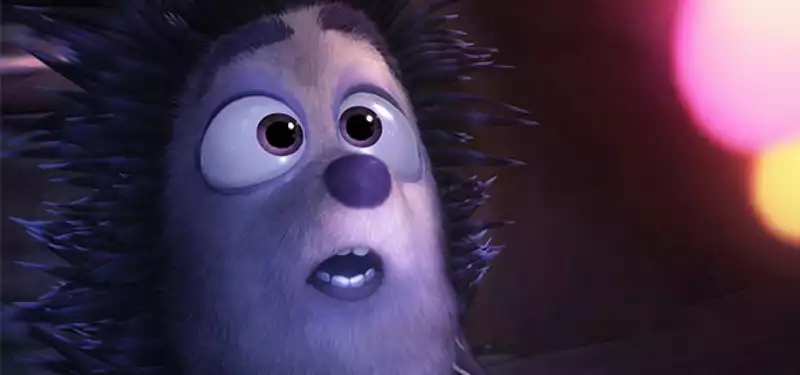Jul 29, 2015
Oculus Announces "Henry," an Immersive Virtual Reality Short Film
On the surface, Oculus Story Studio's new 12-minute short film "Henry" is a sweet tale of a loveable hedgehog who just wants to make friends, but nothing can stop him from hugging Spike.
But digging beneath the surface reveals a world full of promising possibilities, hampered only by the frontiers of virtual reality technology and filmmaking. From the multilayered interiors to the moving parts - not just the adorable Henry, but a flock of flying balloon puppies, a flying birthday cake, and a cute ladybug - "Henry" is a pioneering VR experiment that pushes the limits of storytelling, if only slightly. [Sashka Unseld, creative director of Oculus Story Studio, director of Pixar's "Blue Umbrella," told Cartoon Brew yesterday at a media-only unveiling at a luxurious Beverly Hills mansion above smoggy Los Angeles. He said." We can't really challenge ourselves, and this is only our second film, so the more we do it, the more we feel like we're in film school again."
See alsoOculus Creative Director Saschka Unseld: Oculus' first short, "Lost," was both an honest homage to Brad Bird's 2D/CGI immortal masterpiece "The Iron Giant" and a lesson in how VR films are made and also a lesson in how to make one. For fans of "The Iron Giant" in particular, the sight of giant robotic hands exploring the dark forest was quite impressive, but it all happened right in front of the viewer's eyes and within the frame, the realm of conventional cinema. Anseld, a 10-year veteran of Pixar, and Max Plank, technical director of Oculus Story Studio, wanted "Henry," directed by Ramiro Lopez Dow, animator on "Brave" and "Cars 2," to exist inside a 360-degree sensor, he told Cartoon Brew.
"'Lost' was very cool, but it was a two-sentence story," said Plank, a distant descendant of the Nobel Prize-winning physicist of the same name. Henry is much more complicated."
The audience can manipulate Henry's view by standing or sitting, climbing up and down the hedgehog stairs or peering through the hedgehog door to witness what lies beyond the short story's protagonist. Henry the hedgehog is an endearing character, but with so much rich content and renderings to explore, it can be difficult to focus on him. The desire to adjust one's position and attention to enrich the personal experience has great power over how the recipient experiences the short story. When lonely Henry's thorny, hollow hairs explode balloon puppies or destroy birthday cakes, it is easy to forget about him as he moves around to take in all the scattered data.
To be sure, a wireless Oculus Rift is not likely to appear anytime soon. But taken as a whole, Henry is a big improvement over the already intriguing Lost, and also an indicator of VR to come.
"The reason the film works is because the director frames the moment perfectly," Plank told Cartoon Brew. And now we are abandoning that." Saschka calls it a "state of letting go," but it's okay for people to look around. It's their choice."
Making experiential choices certainly makes VR films dramatically more exciting than traditional films. According to Ansell, Oculus is experimenting with greater interactivity that allows viewers to be more involved in manipulating objects within the experience. But all of this was fairly new, not only for both directors, but for the entire Oculus presentation, and those who saw "Henry" were left with the sense that they were learning how to experience a VR film as much as the filmmakers were learning how to make a VR film.
See also: Oculus TD Max Planck interview: "We want to inspire VR Citizen Kane"
"This mixture of loving the process of making VR films but also realizing how little we actually know or can do about it There's always something," Anseld said. What we learned from 'Lost' is that you have to give the viewer some space in the beginning so that they can settle in and look around a little bit." [This point was underscored in a presentation that featured famous clips from films by Georges Méliès, Buster Keaton, Charlie Chaplin, and other icons of the explosive birth of cinema. Oculus understands that it is in fairly new territory that is sure to be overtaken by more confident and complete VR cinematic visions that follow in its pioneering footsteps. But Oculus aims to carry on the VR film gene for the interactive auteurs to come.
"Today's filmmakers are great because they grew up watching Spielberg and other directors," Plank predicts, "and tomorrow's VR filmmakers will only destroy us. So we want to be the Méliès of VR, where someone comes along and makes 'Citizen Kane,' setting the stage, so to speak. We may never create a VR 'Citizen Kane' ourselves, but we want to inspire it."
Henry will be available to the public when the production version of the Oculus Rift headset is released in early 2016.
.



Post your comment